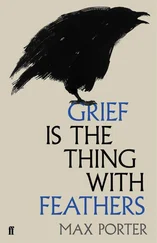“Ah, you’re a professional,” Will said. It was a good picture. He looked like a big hulking fool, with his sleepy, stupid gaze and his slack idiot’s mouth: Gob had captured him. There were no spirits in the picture, but they clustered around Will to look at it, as if expecting to find themselves in the glass.
Just as the day ended, they went up to the roof. Will had never shown the glass house to anyone, because he had no friends with which to share any secrets, least of all a peculiar monument to death, a greenhouse fit for the cultivation of fat white tombflowers. But he thought it would interest Gob, because pictures fascinated him, and because death fascinated him. And Jolly pointed urgently at Gob, at the stairs, at Gob again, and made sweeping motions with his hands, as if to shoo the both of them up to the roof.
“You’re a builder, too,” Gob said when he saw it. It was a warm Sunday in February. The last night’s snow had been melting all day off the glass house, so it looked clean and fresh and wet. Gob reached out with his hand, running his finger from plate to plate. A crowd of spirits gathered, between eyeblinks, to watch him. “May I go in?” Gob asked.
“Certainly,” Will said. Then he thought how it might change Gob as it had changed him, and he said, “Wait, it could hurt you.”
“I’m sure it won’t,” Gob said, and he went into the house. Will put it down to a trick of the setting sun, how yellow light flashed inside. Spirits were all around them. They joined hands to circle the house, and then they danced around it, first one way, and then the other. Will had never seen them all so happy. Even ever-angry Frenchy was happy, even Sam was smiling and dancing. Only the angel boy didn’t dance. He perched on the top of the house, blowing his bugle at the sun.
Did it follow, Will wondered, that if you could see them you ought to be able to hear them, too? What logic governed such interaction? He could hear the cannon still sounding, still deafening, still waking him every so often from sleep. Often it was just Frenchy standing watch over his bed. Sometimes he had a plate with him, one upon which pictures flashed like the images from a magic lantern. Will saw the faces of strangers, night landscapes, scenes of the war, a shack on a hill with a decaying orchard behind it, a dark thick wood at twilight. Frenchy would point at the images and talk, wearing the same expression as when he’d been Will’s living instructor, an angry, impatient look that very often got screwed up into a raging scowl as he yelled and yelled.
“I can’t hear you,” Will would say, when Frenchy worked himself into a fury. “But it suits you, sir, this quietness. I think it has made you likable, dear Frenchy.” This made him angrier, but Will, grumpy anyhow at being woken, felt compelled to tease him. “Dear, meek Frenchy. Quiet as a mouse!”
Will stood on Fifth Avenue, looking up at Number 1 East Fifty-third Street, wondering if his friend could really live in this enormous house. Gob had invited him for supper, reciprocating, Will supposed, the invitation to Brooklyn. “We’ll eat,” Gob said, “and then I’ll show you something.”
It was only a day since Gob had stumbled weeping out of the glass house. Will had caught him by the shoulders and said, “I knew it! It’s hurt you to go in there.” But Gob said he was crying tears of joy, and then he hurried off, saying only that he had work to do.
Gob opened the door, looking exhausted but very happy. “My friend!” he said. “There you are!” He clapped Will on the back and drew him inside. It was the finest house that Will had ever seen, though very dirty. There were three reception rooms and two drawing rooms, with what must have been five hundred mirrors hanging on all their high walls. In the dining room there was a table four times as long as Will was himself. There was a meal already set up: soup, corn, green peas, cabbage, beets, puddings and pies, a salad of dandelion greens, pork with stewed apples, steak with peaches, salt fish with onions, coffee and wine and cold root beer. Gob played with his food, arranging it in patterns on his plate, but not eating much. “I’m never hungry when I’ve been working,” he explained. Will waited for Gob to speak of the glass house, to tell him what had happened inside, but he said nothing of it. Will had been ready, when Gob came out, to make a confession to him: I see spirits or I fear I’m insane , and he had hoped, he knew now, that Gob would say, Oh yes, those pesky spirits. They’re everywhere! It would be so pleasant, so unburdening, to share the affliction. But Gob gave no sign of seeing the spirits. As Will had approached Manhattan on the ferry, they’d run like children, leaning dangerously over the rails, pointing excitedly at the churning water. When Gob opened the door, they’d swarmed into his house like yokels bustling to get into Barnum’s. Now, they sported everywhere in the room. Sam stood by the table, looking sadly at a pudding, not a foot from Gob’s elbow.
Will sighed. Since Gob was not forthcoming, he would be rude. Gob was talking about how long ago, with Dr. Wood looking on, he’d removed a tumor from the jaw of Emily McNee, the Sozodont dentifrice heiress. He was praising her teeth when Will interrupted.
“What did you see, there in my little house?”
“Ah,” Gob said, smiling and passing a hand over his eyes. “What did I see?”
“Yes,” said Will. “That’s what I asked.”
“What did you see?”
“I saw nothing,” Will said, “but now I see … spirits. There. I’ve said it. Sir, I think it cost me my sanity to go into that place.”
“Spirits!” Gob said, and Will thought at first that he was angry. He put his face in his hands, and his voice was plaintive. “I wish I saw them! I wish I did. But that comfort is denied me.”
“Comfort? You don’t think,” Will said, “that such visions are manufactured by a sick mind?”
Gob raised his head and gave Will a scornful look. “You insult my mother,” he said. Will did not know whether or not to apologize, because now Gob was laughing, louder and louder, and pounding his fist on the table so forcefully that plates danced and glasses tipped.
“Come along,” Gob said, when he had calmed some. “Let’s have the rest of the tour.” He took Will’s arm and walked with him. In the parlors, there were marble-topped tables, armchairs and sofas of black lacquered wood inlaid with mother-of-pearl. There were rugs two and three deep on the floor, stained in the corners but otherwise bright and beautiful. And there were books everywhere, stacked on tables or furniture, or against the walls. Will picked one up at random. It was dusty and smelled of mold, but the binding was rich leather, and the title stood out in gold on the spine: The Dove of Archytas.
“Of course,” said Gob. “You’d like to see the library, wouldn’t you?”
That room took up most of the second and third floors. They climbed a spiral staircase to the iron mezzanine and looked down at the floor, where a score of grandfather clocks, all run down and silent, were set randomly around the room, among golden armillary spheres and dusty overstuffed chairs.
“My master liked clocks,” Gob said.
“You mean your late uncle?” Will asked. “Dr. Oetker?” At Bellevue, Dr. Oetker had had a reputation for brilliance. Will had heard that he had made a fortune catering to the ills of fashionable and unfashionable society.
“He was not my uncle. But he admired a good clock. He’d ask me sometimes, ‘Who is the god of the future?’”
“Professor Morse?” said Will. Gob laughed.
“That answer would have gotten you a slap.”
“What was the answer, then?”
Читать дальше












